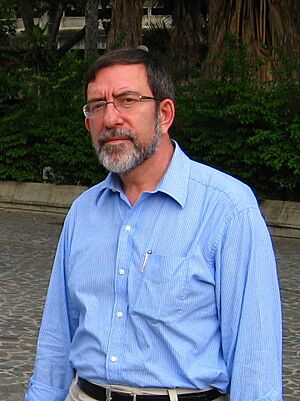History of Bulgaria (1990–present) facts for kids
The history of Bulgaria from 1990 to today is about what happened in Bulgaria after the end of Communism. This was a time when the country changed from a system where the government controlled everything to a market economy where businesses are mostly private.
Contents
- End of Communist Rule
- A Difficult Change
- Zhan Videnov's Government (1995–1997)
- Ivan Kostov's Government (1997–2001)
- Simeon II Returns (2001–2005)
- The Triple Coalition (2005–2009)
- First Government of Boyko Borisov (2009–2013)
- Plamen Oresharski's Government (2013–2016)
- Second and Third Governments of Boyko Borisov (2017-2021)
- Stefan Yanev as Interim Prime Minister (2021)
- The Quadruple Coalition (2021–2022)
- The Rotation Government (2023-Present)
End of Communist Rule
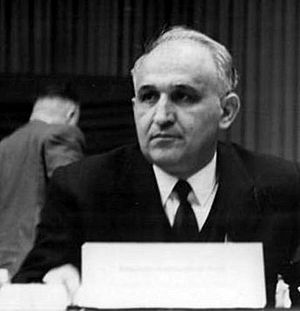
In the late 1980s, big changes started happening in countries like Bulgaria that were part of the Eastern Bloc. This was because of new ideas from Mikhail Gorbachev in the Soviet Union. People in Bulgaria slowly started to get more freedom. They could read books and watch movies that were once forbidden. Stores even started selling Western products. These changes showed that the "Iron Curtain" (a barrier between Eastern and Western Europe) was slowly breaking down.
In November 1989, people in Sofia protested about the environment. These protests quickly grew into a bigger demand for political changes. The Communist leaders eventually voted to remove Todor Zhivkov, who had led the country for a long time. They replaced him with Petar Mladenov. But this didn't stop the protests.
In February 1990, the Communist Party gave up its power because of street protests. In June 1990, Bulgaria held its first free elections since 1931. The Bulgarian Socialist Party (which was the new name for the Communist Party) won. In July 1991, a new constitution was created. This new rulebook set up a system with an elected president and a prime minister.
A Difficult Change
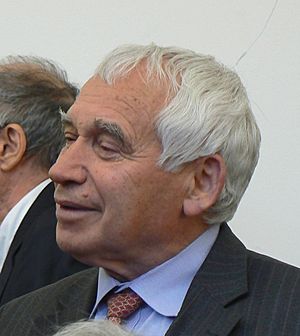
Changing to a market economy was very hard for Bulgaria, just like for other countries in Eastern Europe. The anti-Communist party, the Union of Democratic Forces (called SDS), took power between 1991 and 1992. They started to privatize (sell to private owners) farms, homes, and factories. They gave shares in government businesses to all citizens.
However, many people lost their jobs. Factories that used to sell goods to other Communist countries now struggled to compete in the global market. Bulgaria's industries were also not modern enough. At the same time, the old State Security police (DS), which had kept crime low through fear, was disbanded. This led to a big increase in crime. Many factories and institutions had their equipment and materials stolen. This caused many businesses to fail.
Zhan Videnov's Government (1995–1997)
The Socialists (former Communists) promised to protect poor people from the problems of the free market. Many people were unhappy with the economic changes because they caused high unemployment. This allowed Zhan Videnov from the Bulgarian Socialist Party to win the 1994 elections.
Videnov was very young when he became prime minister. People around him took advantage of his inexperience. His government's policies made the economic situation even worse. Western countries did not support his government, which hurt Bulgaria's foreign relations. In 1996, the economy faced hyperinflation (prices rising very quickly) and many banks went bankrupt.
In the presidential elections that year, Petar Stoyanov from the SDS party was elected president. In 1997, the Socialist government collapsed after a month of protests across the country. President Stoyanov appointed a new government that helped calm the economic situation. Later, the democratic SDS party came to power.
Ivan Kostov's Government (1997–2001)
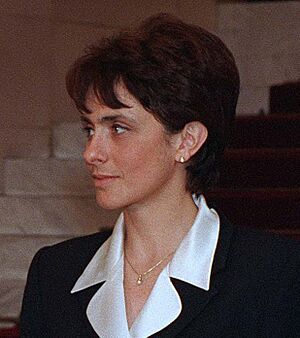
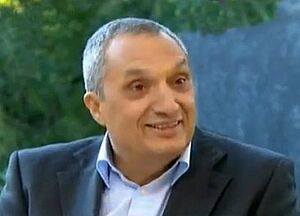
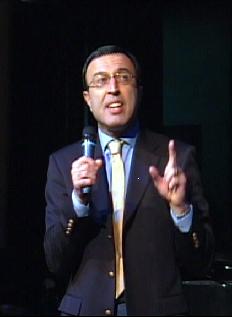
The new democratic government, led by Ivan Kostov, had strong public support and helped the Bulgarian economy improve. However, there were claims of corruption and problems that the government couldn't solve. This made people unhappy with both the Socialist Party (BSP) and the SDS.
President Stoyanov tried to get re-elected, but he made a mistake on TV and lost support, and the election. The new president was Georgi Parvanov, a former BSP leader. He was seen as a wise and independent leader, even though he was from the BSP. People were looking for new political options because they were unhappy with both major parties.
Simeon II Returns (2001–2005)
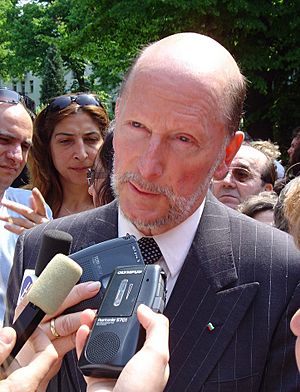
In 2001, Simeon Saxe-Coburg-Gotha became Prime Minister of Bulgaria. He was the son of Tsar Boris III of Bulgaria and had left Bulgaria as a nine-year-old boy in 1946 when the Communists took over. In 1996, he visited Bulgaria and announced he would return to form a new political party.
A few years later, Saxe-Coburg-Gotha created the National Movement Simeon II (NDSV). In the June 2001 elections, his party won by a huge margin, defeating the two main parties. As Prime Minister, he strongly supported Western countries. Because of his efforts, Bulgaria joined NATO in 2004 and the European Union (EU) in 2007. The economy improved, but unemployment and emigration (people leaving the country) remained high. Problems like corruption, healthcare, and organized crime still needed big changes.
The Triple Coalition (2005–2009)
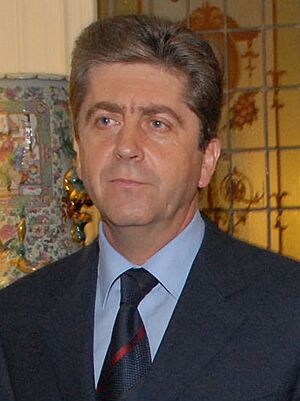
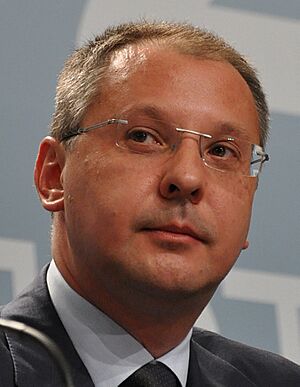
In the next elections, the NDSV didn't get enough votes to form a government on its own. The BSP won the most votes, followed by NDSV. Since no single party had enough seats, President Parvanov helped form a coalition government. This government included the BSP, NDSV, and MRF (Movement for Rights and Freedoms).
Even though these three parties had different ideas, they worked together for one main goal: to complete the reforms needed for Bulgaria to join the European Union in 2007. However, the government was not very effective, and high-level corruption remained a serious problem. This made it hard for foreign businesses to invest in Bulgaria. Also, during the last months of Sergei Stanishev's government, the world faced a financial crisis. The government denied the crisis and didn't take steps to protect Bulgaria's economy, which led to widespread disapproval.
First Government of Boyko Borisov (2009–2013)
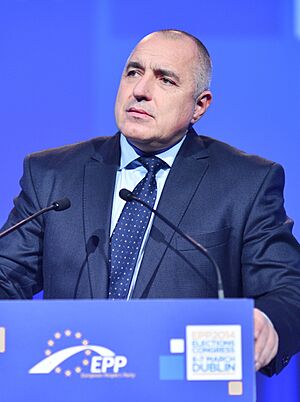
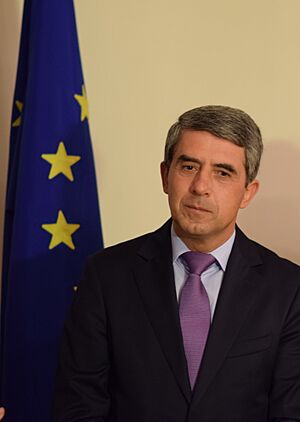
In the 2009 elections, the center-right party Citizens for European Development of Bulgaria (GERB) won, taking 117 out of 240 seats in Parliament. The Socialists were far behind with 40 seats. The NDSV did not get enough votes to enter Parliament.
The new government, led by Boyko Borisov, aimed to change the education system and focus on careful spending. The Ministry of Finance reduced the government's debt by reforming administration and selling state-owned companies. However, this government fell on February 20, 2013, after many street protests. People were unhappy with the strict spending cuts, delayed government payments to private companies, and wiretapping scandals involving the Minister of the Interior.
Plamen Oresharski's Government (2013–2016)
The government of Plamen Oresharski was not well-liked. This led to protests that lasted a year, eventually causing his government to fall in 2016.
Second and Third Governments of Boyko Borisov (2017-2021)
In March 2017, Boyko Borisov became Prime Minister of Bulgaria for the second time. He had resigned earlier and called for new elections after his GERB party lost the presidential elections. He formed a coalition government with nationalist parties. The Socialist Party and the Turkish Movement for Rights and Freedoms formed the opposition.
In April 2021, Borisov's party won the parliamentary election again. It was the largest party, but it didn't win enough seats to govern alone, meaning it would be hard to form a new government. Bulgarian President Rumen Radev, who often criticized Borisov, announced he would seek a second term as president.
Borisov's last government saw a big drop in press freedom and many corruption scandals. This led to another wave of large protests in 2020. Even though GERB came first in the April 2021 election, it was their weakest result so far.
Stefan Yanev as Interim Prime Minister (2021)
All other parties refused to form a government. After a short period of no clear government, new elections were called for July 2021. Stefan Yanev served as an interim Prime Minister until then.
In the July 2021 snap election, a new anti-elite party called There Is Such a People (ITN) came in first. Former Prime Minister Boyko Borisov's GERB-led group was second.
In November 2021, President Rumen Radev was easily re-elected in the presidential election, though not many people voted.
The Quadruple Coalition (2021–2022)
The next snap election was in November of the same year. Kiril Petkov's PP party surprisingly won, beating the conservative GERB party that had been in power for nine years. In December 2021, Bulgaria's parliament officially elected Kiril Petkov as the country's next prime minister, ending a long political crisis.
The new government was a coalition led by Petkov's anti-corruption We Continue the Change party (PP) and three other groups: the left-wing Bulgarian Socialist Party, the anti-elite There Is Such A People party, and the liberal group Democratic Bulgaria. Together, they controlled 134 out of 240 seats in parliament. However, the government lost a vote of no confidence on June 23, 2022, and resigned. President Radev then appointed Galab Donev as acting prime minister. Bulgaria held its fourth parliamentary elections in less than two years on October 2, 2022. But the results did not allow a new government to be formed.
The Rotation Government (2023-Present)
In April 2023, because of the political problems, Bulgaria held its fifth parliamentary election since April 2021. GERB was the biggest party, winning 69 seats. The group led by We Continue the Change won 64 seats.
In June 2023, Prime Minister Nikolai Denkov formed a new coalition between We Continue the Change and GERB. They agreed that Denkov would lead the government for the first nine months. After that, Mariya Gabriel from the GERB party would take over as Prime Minister.
|
 | Audre Lorde |
 | John Berry Meachum |
 | Ferdinand Lee Barnett |


